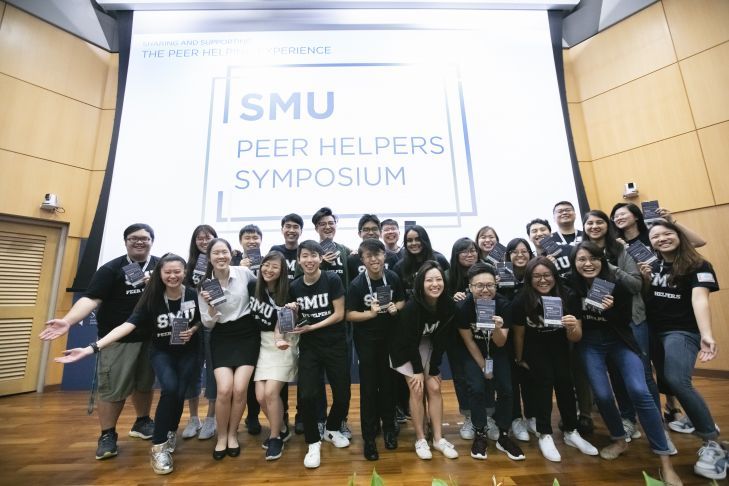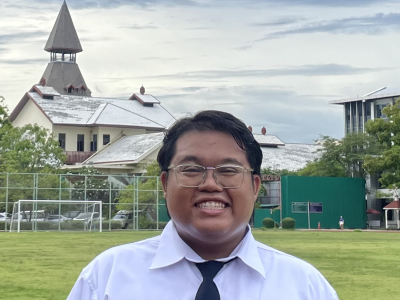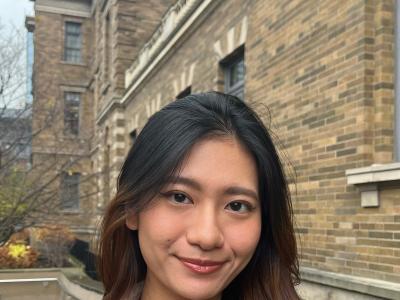
On 11 October, some 150 teachers, counsellors and peer helpers from various schools and institutions attended the second edition of the Singapore Management University (SMU) Peer Helpers Symposium with the theme - Sharing and Supporting the Peer Helping Experience.
It was first launched back in 2017, to offer a platform to share information with schools and institutions who are keen on developing a peer helping programme, as well as for existing peer helping groups to meet, connect and learn from one another.
Organised by SMU’s Mrs Wong Kwok Leong Wellness Centre (WKLSWC) and SMU Peer Helpers, participants gained from insights from the various speakers on the importance of seeking help early, managing good mental health, and how we can all be a part of it.

Welcome Address by Professor Lily Kong, SMU President
In her welcome address, President of SMU Professor Lily Kong shared that SMU places utmost priority on the wellness and safety of students throughout their academic journey. Students have been offered in-house counselling services since 2003, and the Peer Helping programme was initiated in January 2004. This is within the context of a university established in the year 2000.
By July 2007, a centre for counselling and guidance was set up and this was renamed the Mrs Wong Kwok Leong Student Wellness Centre in 2013, after the Centre’s main donor. Till today, it remains a place where professional counsellors are committed to providing the best mental health support for our student community.
She added that this year marked the 15th Anniversary of the SMU Peer Helpers initiative. The SMU Peer Helpers is a group of about 60 full-time undergraduate students who are specially selected and trained to support the work of the counsellors at the Centre. Each SMU Peer Helper commits to a dedicated duration of 13 weekly two-hour training sessions per academic term, guided by the Centre’s counsellors and external trainers. They form the emotional safety net of the student community, acting as a bridge which connects the Centre with the students. Together, they serve to promote the holistic development of our students, support the provision of counselling services and widen the helping network for students in distress.

Keynote Speech by Dr Matthew Wawrzynski, Associate Professor at the Michigan State University - “The Power of Peer Education: Reflecting on 15 Years of Insights and Trends in Peer Education”
Dr Wawrzynski’s keynote speech touched on the power of Peer Education where “college and university administrators have taken note of the power of peer influence and have capitalised on using peers to play pivotal roles in enhancing the lives of undergraduate students”.
He shared findings of the “The National Peer Education Study (NPES), 2019” which was a tool to track student education and learning based on six domains. It measures motivations, learning outcomes and training of peer educators (also known as peer helpers). The study found that students consistently reported intrinsic motivations for becoming peer educators and the top three motivators were – helping others, gain additional knowledge and be involved in college.
On the measures taken to motivate a change in peers behaviour, 85% of peer educators believed that role modelling had the greatest impact as compared to 50% who directly confronted a person.
In terms of the 53 learning outcomes listed, peer educators rated themselves higher after becoming one. Based on 2013 to 2018 trends, the top five outcomes in peer educator position activities were “knowledge about campus resources”; “knowledge about general health issues”; “referring someone to counselling”; “presenting an educational programme with a teammate” and “comfort with distributing information at an awareness table”. On the other hand, the top five outcomes associated with personal development were “feeling a part of the campus community”; “recognising and accepting strengths and deficiencies”; “re-evaluating previous assumptions”; “formulating an innovative approach or solution to an issue or problem” and “having a positive self-concept”.
For outcomes in Intrapersonal Development, 95.1% said they had a better understanding of oneself after becoming a peer educator. In terms of practical competence, 96% said they had knowledge about general health issues after becoming a peer educator as compared to only 25% prior to becoming one. As for Interpersonal Development, there was a 43% increase (47% to 90%) in growth for effectively demonstrating skills leading a group.
In terms of trends in training, the number of training hours conducted for peer educators continues to increase year on year and 85% of peer groups receive training on areas such as mental health awareness, bystander intervention, sexual assault/relationship violence and stress management. In addition, 62% of peer educators continue to have conversations with peers even though they are not trained in certain topics such as vaping, eating disorders and self-harm prevention.
Dr Wawrzynski put forth a set of recommendations. For learning outcomes, he suggested developing a set of learning outcomes to help educators and students identify intended learning for their work as peer educators. When recruiting peer educators, he said it was important to emphasis transferrable skills that students could gain from a peer educator position such as career preparation, social networking and leverage the intrinsic benefits of a peer educator role. Lastly, he suggested to align training curriculum with topics that peer educators are engaging in with students.
Dr Wawrzynski closed the session with these wise words, “In times like these you just don’t MAKE a difference, you ARE the difference! Always remember YOU are doing exceptionally VALUABLE work to make a DIFFERENCE in the lives of college students who in turn...will change the world.”

Sharing by Professor Timothy Clarke, SMU Provost on “Developing a Framework for Student Support: A Whole University Approach”
Professor Clarke spoke about his previous role at Durham University where he was part of the crisis management team and the difficult issues he had to deal with that related to student welfare and mental health issues. There, he did some reflection and was also tasked to conduct a review of their welfare and student support system. Similarly at SMU, he recently reviewed the student disciplinary framework.
He said that university life is a new phase for most students as this is when they face financial issues (when they move out of home and thus need more money), relationship issues (possible change in circle of friends) and having to cope with a new academic curriculum. Thus, it can be stressful for some and studies have shown that females find it more difficult to cope with such issues. He mentioned that he had attended an educators leaders meeting last year where almost all agreed that mental health issues were the main challenges faced today and they had questioned if they were well equipped to handle these challenges.
How we can structure student and wellness support? Prof Clarke believed that a whole university approach is required to do this. He cited various factors – Leadership, data (evidence required to understand scale of issues we are dealing with), staff, anticipation/prevention, early intervention, peer support, transitions and collaboration/partnership – as part of the support system. He said that although universities had many safety nets, we still needed to ensure that these nets “are connected and well supported. In addition, we need to have partners (e.g. health services) for us to leverage on and build up our skills. We also need to train people, and our colleagues, so they can identify when help is required”.


Sharing by Professor Paulin Straughan, Professor of Sociology (Practice) & Dean of Students at SMU on “Demystifying Mental Illness”
Professor Paulin Straughan shared how mental illness is a social construct - “subjective reality where meanings are socially constructed and illness behaviour is learned behaviour”. To make sense of things, humans tend to label and associate certain behaviours, such as having an unreasonable behaviour equals to being mad or crazy. Thus, mental illness equals mad or unreasonable behaviour and this negative stigmatisation is entrenched by fear and a knowledge gap.
She also touched on medicalisation of mental illness, which is to define a behaviour as a medical problem and mandating the medical profession to provide treatment. She said that this had unintended consequences and contributes to stigmatisation and labelling issues which prevents some from seeking help. Moreover, insurers currently exclude medical illness in claims and the cost of treating mental illness, both direct and indirect, can be quite high.
She hopes that we can all move towards having an inclusive society where everyone can work towards the vision to “Evolve a safe environment (social, economic, political) where persons with mental health issues can step out without fear and feel relieved of the burden of keeping their condition a secret”. Adding on, she stressed the importance of removing barriers of discrimination, having medical insurance coverage, employment without prejudice and more community integration.
She then shared an example of how a senior student had advised a junior to go and see a counsellor and how that session was useful and meant a lot to the junior. In closing, she lauded the important work of Peer Helpers and urged them to continue to play a peer helper role when they join the workforce.
“Nurturing the Holistic Student through the Peer Helpers Programme” by Alvin Sim, Head of Co-curriculum Development, Office of Dean of Students, and Phan Hoang Long, SMU Peer Helper

Alvin Sim, Head of Co-curriculum Development, Office of Dean of Students, said that many students sign up for co-curricular activities due to peer influence and personal interest without much thought about skills development and learning outcomes. Thus, students may go from activity to activity without understanding what they are getting out of it and how it connects to life after university.
“At SMU, our objective is to render visible the learning outcomes from co-curricular activities. Thus, we use reflective practice as a strategy to nurture self-directed life-long learners to future-proof our graduates’ skills. We align the learning outcomes from co-curricular platforms to graduate learning outcomes and beyond-disciplinary skills valued by employers and competencies required to succeed in the workplace”.
He added that for the Peer Helpers Programme, learning experiences have been curated with “frontloaded learning” (training modules and workshops) as well as “experiential learning” (applying helping skills and planning and organizing events) incorporated.

SMU Peer Helper, Phan Hoang Long, Year 4, School of Social Sciences, spoke on the 18 Learning Outcomes listed for the Peer Helpers and cited being “able to apply the basic helping skills – empathic listening, paraphrase and reflective of feelings”, “able to examine personal values, attitudes and strengths” and “able to work with other Peer Helpers as a team to develop and grow” as the top three chosen by the Peer Helpers.
He shared that the programme has helped peer helpers become more comfortable and acquainted in applying the basic skills which allow peer helpers to be a better listener for their peers. In addition, it has allowed them to learn how to help their friends and acquaintances and to build strong bonds within their community. Lastly, the programme has helped peer helpers to be more confident in applying peer helping skills as well as be more self-aware and reflective in their learning and beyond.

Panel Session
The audience were invited to submit their questions before the session and the questions submitted ranged from strategies to start and maintain a peer helpers programme, to coping mechanisms in today’s world, to challenges the community face as they work on demystifying mental illness in society.
In tackling the question on effective strategies one could adopt when setting up a peer support system, Dr Matthew Wawrzynski replied that whenever a peer support system (or any programme) has been set-up, it must be publicised so that others would know about it and use it. He added that if the people who helped to create the programme and are involved in it, they are more likely to support it.
In order to sustain the programme, Dr Ada Chung shared her “4Ps approach”. People – A good team is required in order to work together to build up holistic support. This includes supportive bosses and colleagues. Partnership – Apart from requiring the various internal departments are required to help train student leaders on mental health, we also require external partners to help with the training programme and workshops. Purpose – Always go back to the mission and objectives of the programme. Define all roles clearly and stick to them, and conduct regular evaluation and review feedback. Last but not least, Peer Helpers – the selection process is important as you need the right people with the right fit to join as a peer helper and be a role model to others.
On coping with mental well-being in a relatively stressful society, Prof Chong said of how measures and interventions that will stress an individual needed to be looked at. He advised all to “have a sense of purpose in life and keep oneself active. Have plenty of sleep and try not to keep playing with your mobile phones!”
Several alumni took turns to share how the SMU Peer Helpers programme had impacted their lives and how they still return to contribute back to the school either as mentors or helping out at events. SMU Peer Helper, Esther Low, Year 4, Lee Kong Chian School of Business, also shared that she had benefitted from the training given and she said that it was “important to practise self-care – look out for yourself before supporting others”.
The afternoon ended with an appreciation for the speakers and smiles from participants who gained from the insights learned.
According to Dr Ada Chung, Head of WKLSWC, “Both symposiums have been well received and we hope to continue leading the way in sharing and advocating the importance of peer helping on a nationwide scale.”
[Featured photo: The SMU Peer Helpers Network]


